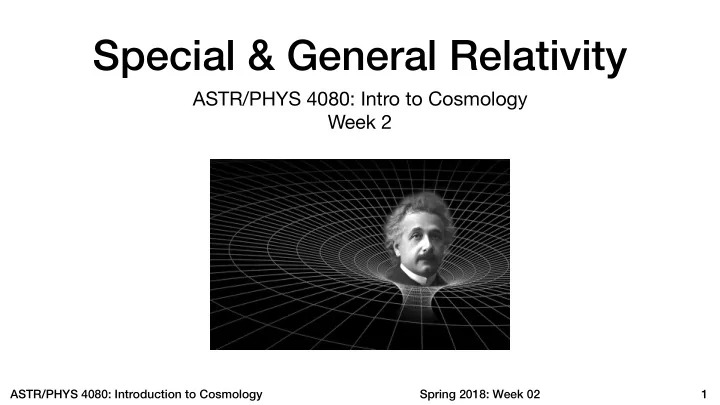

Special & General Relativity ASTR/PHYS 4080: Intro to Cosmology Week 2 ASTR/PHYS 4080: Introduction to Cosmology Spring 2018: Week 02 1
Special Relativity: no “ether” Presumes absolute space and time, light is a vibration of some medium: the ether ASTR/PHYS 4080: Introduction to Cosmology Spring 2018: Week 02 2
Equivalence Principle(s) F = − GM G m G F = m I a r = m G g ˆ r 2 reflect the strength of the grav. interaction; reflect an object’s inertia nothing to do with inertia at all; (how hard to make it move) may just call it “gravity charge” (like electric charge) Galileo, and later Eötvös, experimentally demonstrated that: m I = m G suspicious… ASTR/PHYS 4080: Introduction to Cosmology Spring 2018: Week 02 3
Equivalence Principle: Newton “Gravitational mass” and “inertial mass” are equivalent You cannot distinguish gravity from any other acceleration Gravity even affects massless particles like light Only applies to mechanics: E&M not included until special relativity ASTR/PHYS 4080: Introduction to Cosmology Spring 2018: Week 02 4
Equivalence Principle: Einstein Also, implies gravitational redshifting No experiment can distinguish between an accelerated frame and a gravitational field – they are completely equivalent “Special” relativity applies in the absence of gravity “General” relativity generalizes the postulates of SR to include gravity Mach’s Principle: inertial frames aren’t absolute, but determined by the distribution of matter — can’t have motion without something else a thing is moving relative to ASTR/PHYS 4080: Introduction to Cosmology Spring 2018: Week 02 5
Implication of Stricter Equivalence for Light Fermat’s Principle in optics states that light travels the minimum distance between two points If light takes a curved path, space cannot be Euclidean (flat) because the shortest path in Euclidean geometry is a straight line If space is curved (like surface of a sphere), then Fermat’s Principle may still hold —> Matter (and Energy, b/c E=mc 2 ) tells spacetime how to curve, and curved spacetime tells matter (and energy) how to move ASTR/PHYS 4080: Introduction to Cosmology Spring 2018: Week 02 6
Experimental Confirmation of GR Angle in GR is ~1.75”: additional deflection due to curved space-time “Confirmed” by Arthur Eddington during the 1919 solar eclipse —> reason Einstein became famous ASTR/PHYS 4080: Introduction to Cosmology Spring 2018: Week 02 7
Curvature How can we measure the curvature of spacetime? = area of triangle = Radius of Curvature Only possible geometries that are homogeneous/isotropic ASTR/PHYS 4080: Introduction to Cosmology Spring 2018: Week 02 8
Characterizing Curvature Parallel Transport transport a vector around a triangle, keeping the vector at the same angle wrt your path at all times change in vector when you arrive back at your starting position ⟶ curved space ASTR/PHYS 4080: Introduction to Cosmology Spring 2018: Week 02 9
Length of a (Euclidean) Line ASTR/PHYS 4080: Introduction to Cosmology Spring 2018: Week 02 10
Lengths of Geodesics (3D, polar coords) straight lines in a given geometry <OR> flat or Euclidean space: elliptical or spherical space: hyperbolic space: ASTR/PHYS 4080: Introduction to Cosmology Spring 2018: Week 02 11
Minkowski & Robertson-Walker Metrics metrics define the distance between events in spacetime Minkowski (no gravity: metric in SR) Robertson-Walker (with gravity, if spacetime is homogeneous & isotropic) { light travels along cosmological proper null geodesics, i.e.: time or cosmic time comoving coordinates ASTR/PHYS 4080: Introduction to Cosmology Spring 2018: Week 02 12
Spherical Coordinate System ASTR/PHYS 4080: Introduction to Cosmology Spring 2018: Week 02 13
Spatial part of RW metric S k ( r ) sin θ d φ S k ( r ) sin θ S k ( r ) d θ dV = S 2 k ( r ) sin θ d θ d φ dr At time t, adr, aS k ( r ) d θ , aS k ( r ) sin θ d φ ASTR/PHYS 4080: Introduction to Cosmology Spring 2018: Week 02 14
Proper Distance In an expanding universe, how do we define the distance to something at a cosmological distance? The distance between 2 objects at the same instant of time is given by the RW metric: called the “proper distance” ASTR/PHYS 4080: Introduction to Cosmology Spring 2018: Week 02 15
Redshift and Scale Factor Proper distance is not usually a practical distance measure. For example, you might rather want to know the distance light has traveled from a distant object so you know the “lookback time” or how far you’re looking into the past. Relatedly, we measure redshift, but would like to know how redshift is related to the change in scale factor between emission and observation, which is: ASTR/PHYS 4080: Introduction to Cosmology Spring 2018: Week 02 16
Recommend
More recommend